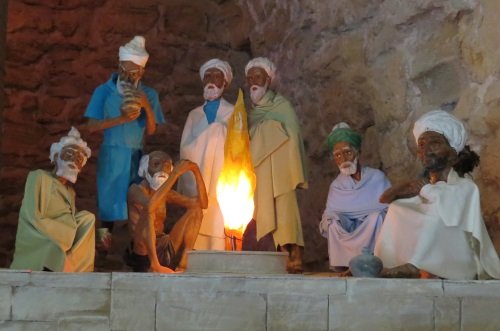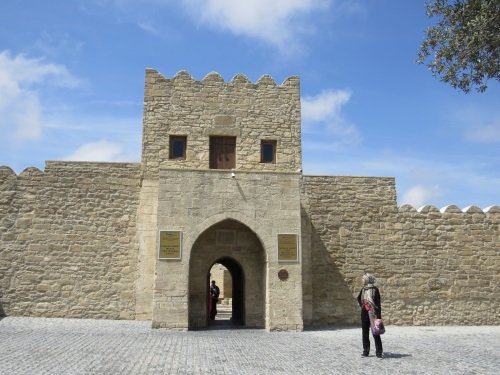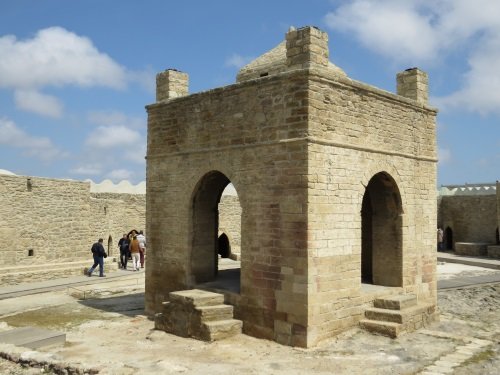Although some 85% of the current Azerbaijani population is Shi’a Muslim, Zoroasterianism still plays an important part in the image the nation presents to the outside world. After Azerbaijan's independence from Soviet Union, the phrase “Land of Fire” was coined as the slogan to promote the country as a tourist destination. It reflects both the natural burning of surface oil deposits and the oil-fueled fires in Zoroastrian temples. So it’s no wonder that one of these temples is on the country’s Tentative List: the
Ateshgah at Surakhani
.

|
|
Interpretation of how it might have looked like in the old days
|
According to
this informative website about Zoroastrian heritage
, the tradition of ‘fire-houses’ started with the development of community fire houses that housed an ever burning flame. The flame was kept going by professional fire keepers. Members of the community would light their house fires from the central community fire. These fire-houses later evolved into temples, which also served as solar observatories in order to fix dates for festivals.
The Ateshgah (“home of fire”) at Surakhani lies about half an hour outside of Baku. On the way out there we first visited Yanar Dag. This is a good appetizer for the actual fire temple, as it is a place where natural gas has been burning continuously since 1957. It’s an odd place, not much more than a small hill with
multiple flames coming out of its base
. This natural phenomenon once was more common in the Absheron peninsula (as this region is called), hence the attraction for Zoroastrians.
The fire temple at Surakhani nowadays is a popular tourist attraction. It is surrounded by a large complex that includes a restaurant, and there are ample parking spaces for tour buses. I visited on a Sunday, and there were many local tourists around.

|
|
Entrance gate to the Ateshgah
|
There's only one entrance to the temple grounds. I read in a
trip report from 1911
that this gate used to be adorned with inscriptions, a swastika emblem, a sun, four flowers and “several nondescript figures”. Now only the sun emblem is visible, positioned between possibly two lions, plus one inscription. When I asked for clarification, our Azerbaijani tour guide told that many of the original inscriptions and decorations had been shipped to Sint-Petersburg in Russia during the communist era.
The fire temple itself lies right in the middle of the inner courtyard, which also has a number of other burning flames. The courtyard is surrounded by a cloister of pilgrims’ cells. These have been turned into small exhibition rooms. It’s good to realize that this isn’t a temple anymore, it’s a museum (although people are free to worship if they want to). And even more anticlimatic: the structure that we see nowadays is a temple built by Hindu/Sikh immigrants in the 17th or 18th century. Zoroastrianism at that time had been eradicated already for some 10 centuries, after the conversion of this region to Islam. And the fires that burn in this courtyard are fed by a gas pipe from Baku…..

|
|
The Hindu-style fire temple
|
Zoroasterianism came to this region around 550 BC via the conquering Persian Achaemenid Empire. Now there are no Zoroastrians anymore in modern Azerbaijan, but the religion still has a hard-to-grasp cultural influence in the country. It may be largely symbolic (flames are everywhere in Baku, from the
Flame Towers
to the billboards announcing the next Baku Grand Prix), as well as folklore. The Ateshgah at Surakhani is another of these symbols. The Azerbaijani will get a hard time though explaining the authenticity of this site to an international audience for a future WH nomination.



